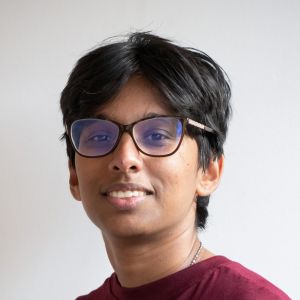Yolani Fernando, MA Governance, Development & Public Policy, Class of 2022-23, is the Co-Founder and Executive Director of Arutha, (Arutha on Instagram) a Colombo-based policy think tank focused on economic research and communication with a special interest in public debt and taxation. In this blog post, Yolani talks about her journey to setting up Arutha and shares her advice for those who have similar goals and aspirations.
Interviewer: What was your career trajectory before coming to IDS?
Yolani: I started my career in the (Sri Lankan) Ministry of Finance during a time of economic reform and was exposed early on the intersections of politics and policy-making and the challenges of public sector accountability. After leaving the Ministry, I began working on international development research with The Asia Foundation, around development cooperation and the broader political economy of aid.

Interviewer: Why did you decide to study here?
Yolani: I chose the Institute of Development Studies (IDS) because it provides a unique experience for policy practitioners, combining academic grounding and practical policy making. At the Ministry, I learned that while generating evidence is necessary, it is insufficient for building political consensus, and I felt that the MA Governance, Development & Policy curriculum addressed this reality. I was already familiar with some of the work done at IDS and the International Centre for Tax and Development (ICTD) and knew that it aligned well with my own research interests. That is why the Institution and course felt like an obvious choice.
Interviewer: How has your time at IDS helped shaped your career path?
Yolani: Distance often gives clarity, and that’s what IDS did for me. I was able to have an eagle’s eye view of policy and development problems that I had seen back in Sri Lanka. IDS gave me the time, space, and guidance to reflect on and critically analyse these problems.
Writing my dissertation on the Political Economy of Sri Lanka’s 2017 Tax Reforms allowed me to rigorously dig into a reform period I had witnessed first-hand. It provided a multidimensional perspective that delves into the interplay of political leadership, commitment, the politics within the Treasury bureaucracy, the challenges faced by the Inland Revenue Department, and external influences on policy reforms from the International Monetary Fund and corporate lobbying.
I was also able to learn from my peers from all over the world about broader development problems and about the dimensions of the global debt crisis. The depth and breadth of what I learned at IDS informs my research and has helped me in building Arutha’s research culture, which aims to provide research support to policy makers, especially within the state bureaucracy.
Interviewer: Can you describe how you came to set up Arutha?
Yolani: In 2022, right before I left for IDS, Sri Lanka was going through a sovereign default and its worst economic crisis in decades. Amidst the chaos of the crisis, there was also rampant economic misinformation. A group of my peers got together to run an online platform called Default LK to combat this misinformation. The year I was at IDS, I laid the groundwork to make the online platform into an actual organisation.
My co-founders and I wanted to stay true to our original goal, educating citizens on the economy. This is why we named ourselves ‘Arutha’ (‘meaning’ in Sinhala), a word that captures our goal of bringing real-world context to economics. One of Arutha’s areas of work is ‘economic civic education’ (i.e. taking economics out of the classroom and teaching it in a way that is relevant to people’s everyday lives).
Interviewer: What are your aspirations for it?
Yolani: Arutha is both a think tank and an organisation committed to making economics accessible. We want Arutha to be a place where rigorous economic research and active public communication go hand in hand. But we are also a young team with strong values, which is reflected in our work and work culture. Ultimately, the aspiration is for Arutha to grow into the next-generation public policy and economics think tank in Sri Lanka, one that changes the narrative on who can talk about economics.
Interviewer: What achievement do you feel most proud of in your professional life?
Yolani: Taking a crisis-born collective and making it into a fully-fledged think tank is easily the highlight of my career so far. I am most proud of the culture we’re building. We’ve been flattening hierarchies to encourage debate, prioritising mentorship and most importantly, reversing the gatekeeping around economics. My co-founders and I were lucky to have people who took a chance on us. Arutha is giving us the opportunity to do the same for more young researchers.
Interviewer: What advice would you give to someone who is early in their career and may have similar goals as you?
Yolani: The most important piece of advice I would give to someone who is reading this and may be inspired to set up their own enterprise? Start small and don’t think of any task as unimportant – not everything you do has to be ‘impactful’. Be patient. Find mentors and be open to mentoring. Don’t underestimate the power of collaboration.

